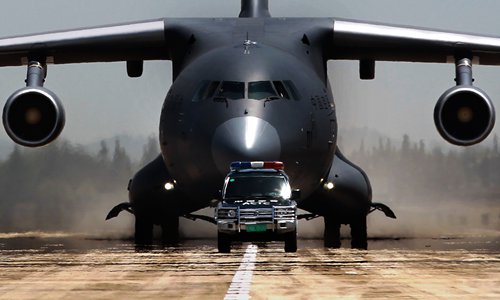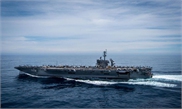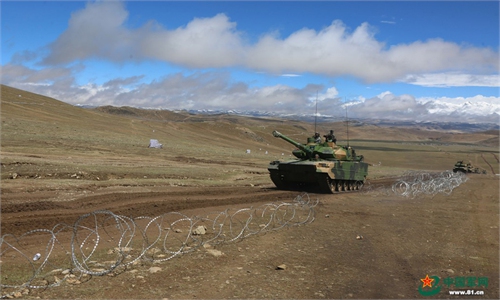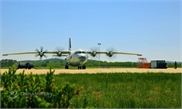China’s Y-20 cargo plane sends Victory Day paraders to Moscow in first Russia visit

A Y-20 transport aircraft taxis in Chengdu, capital of Southwest China's Sichuan Province on June 16, 2016. Photo: VCG
China's domestically developed Y-20 large transport aircraft on Saturday landed in Russian capital Moscow for the first time, sending Chinese People's Liberation Army (PLA) honor guard members to participate in the Russian Victory Day parade scheduled for June 24 despite the seriousness of the COVID-19 situation in the country. This long-distance flight not only demonstrated the aircraft's technical capability, but also displayed the high-level military cooperation between China and Russia, experts said on Monday.Carrying 105 members of the PLA honor guard, the Y-20 cargo plane arrived at Sheremetyevo International Airport in Moscow, China Central Television (CCTV) reported on Sunday.
At the invitation of the Russian side, the PLA soldiers will join the Russian Victory Day parade at Moscow's Red Square scheduled for June 24, the report said.
The Y-20's first Russia visit showed that it has achieved full mission capability in terms of both support and performance, and this type of aircraft will appear in public more often and conduct different missions in the future, Wang Ya'nan, chief editor of Aerospace Knowledge magazine, told the Global Times on Monday.
China previously used Il-76s as its main type of large transport aircraft, importing them from Russia in the early 1990s. The Y-20's first visit to Russia this time marked a new start, analysts said.
The Y-20 travelled a long distance to Russia, prompting Wang to say the Chinese cargo plane has sufficient endurance to conduct cross-regional military missions.
"The aircraft's long range means it can make a direct flight from Beijing to Moscow, but normally, this kind of long-distance travel will require an intermediate stop for logistical support. This is the usual approach between China and Russia when it comes to military cargo plane flights," he said.
Judging from the CCTV report, the Y-20 plane that visited Russia, which has the serial number 20041, was also one of the Y-20s that made the first flight to Wuhan, Central China's Hubei Province, on February 13 and later again on February 17 to support the COVID-19 epidemic fight there.
Wang said that the epidemic situation in Russia is also one of the reasons behind the deployment of the Y-20 rather than a civilian chartered plane, as a military aircraft can transport personnel and equipment together and leave no chance for interactions with external personnel, lowering the risk of infection.
The Y-20 has a capacity of around 60 tons, allowing living materials to be loaded onto the aircraft, which can help reduce contact with people in Russia as much as possible, Wang said.
While Russia has announced that the peak of the epidemic has passed, the situation remains severe. It recorded 8,835 new cases on Sunday, bringing the total number to 528,964, the Xinhua News Agency reported on Sunday, noting that Moscow is the country's worst-hit region, which reported 1,477 newly confirmed cases on Sunday.
At this special time, the Chinese side is still sending troops to Russia to take part in the parade. This shows China's important support for Russia and demonstrates the high-level military cooperation between the two countries, Liu Wendou, co-chairman at think tank Grandview Institution's Decision-making Committee and director of the Russia Central Asian Research Center, told the Global Times.
The PLA troops are also fully prepared to meet the epidemic challenges, as all PLA personnel wore face masks, gloves and goggles upon their arrival in Moscow and took COVID-19 nucleic acid tests before going through customs according to procedures, reports said.
They have checked in at a sanatorium in Moscow and would hold three rehearsals prior to the parade. They will undergo physical examinations every day and take COVID-19 tests every two days in accordance with Russian mechanisms and are prohibited from contacting external personnel.
Wang said the PLA troops are now training at a closed location, while the rehearsals and actual parade will be held in open spaces, as keeping a safe distance can ensure their health and safety.




